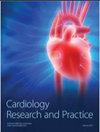埃塞俄比亚西达马省哈瓦萨市哈瓦萨大学综合专科医院心房颤动患者的抗血栓治疗实践--标准简单,利用率却很低
IF 1.8
4区 医学
Q3 CARDIAC & CARDIOVASCULAR SYSTEMS
引用次数: 0
摘要
背景。心房颤动(房颤)与中风和血栓栓塞的死亡率和发病率密切相关。尽管目前已有有效的口服抗凝药物,但如果治疗不当,房颤患者仍有很高的中风风险。本研究旨在评估哈瓦萨大学综合专科医院(HUCSH)成人心脏门诊中房颤患者的抗血栓治疗方法。研究方法这是一项回顾性文件审查研究。共纳入2018年1月1日至12月30日期间在成人心脏门诊随访的119名有房颤病史记录的患者的病历。记录了基于充血性心力衰竭、高血压、年龄≥75岁(加倍)、糖尿病、卒中(加倍)、血管疾病、65至74岁和性别类别(女性)(CHA2DS2-VASc)评分的抗血栓治疗指标。0.05的数值被认为具有统计学意义。数据分析使用 SPSS 23 软件进行。结果在这项研究中,约 55% 的房颤患者接受了适当的抗血栓治疗。患者年龄为(48±18.2)岁。其中 70% 为女性。最常见的潜在心脏病因是慢性风湿性瓣膜性心脏病(50%),其次是心肌病(14%)。在非瓣膜性心房颤动患者中,CHA2DS2VASc平均得分为4.0 ± 1.07。与非瓣膜性心房颤动相比,瓣膜性心房颤动患者更需要适当的抗血栓治疗,使用华法林的患者中只有 8 人(13.6%)进行了适当的抗凝治疗。结论研究结果显示,我们的患者在使用抗血栓药物和维持适当的抗血栓药物以预防中风方面存在建议与实践之间的差异。因此,我们要求符合标准的房颤患者正确使用抗血栓药物预防中风。必须解决服用华法林的患者未达到最佳抗凝状态的问题。最后,我们提倡非瓣膜性心脏病患者正确使用 CHA2DS2-VASc 评分。我们还建议开始服用华法林的患者定期进行 INR 随访。本文章由计算机程序翻译,如有差异,请以英文原文为准。
Simple Criteria, Yet the Dearth Utilization-Antithrombotic Management Practice among Atrial Fibrillation Patients at Hawassa University Comprehensive Specialized Hospital, Hawassa, Sidama, Ethiopia
Background. Atrial fibrillation (AF) is associated with significant mortality and morbidity from stroke and thromboembolism. Despite the availability of effective oral anticoagulation medication, AF patients remain at a high risk of stroke if not treated properly. The purpose of this study was to evaluate antithrombotic therapy practices in patients with AF in the adult cardiac clinic at Hawassa University Comprehensive Specialized Hospital (HUCSH). Methods. It was a retrospective document review study. Total charts of 119 patients who had follow-up at the adult cardiac clinic with a history of documented AF from January 1 to December 30, 2018, were included. Indicators for antithrombotic therapy based on the congestive heart failure, hypertension, age ≥75 (doubled), diabetes, stroke (doubled), vascular disease, age 65 to 74, and sex category (female) (CHA2DS2-VASc) score were recorded. A value of 0.05 was considered statistically significant. Data analysis was done using SPSS 23 software. Results. In this study, about 55% of patients with AF were receiving the appropriate antithrombotic treatment. The patients were 48 ± 18.2 years old. Of these, 70% were women. The most frequent underlying cardiac etiology was chronic rheumatic valvular heart disease (50%), followed by cardiomyopathy (14%). In nonvalvular AF, the mean CHA2DS2VASc score was 4.0 ± 1.07. In valvular AF compared to nonvalvular AF, the need for appropriate antithrombotic therapy was substantially greater Only 8 (13.6%) of the warfarin-using patients had adequate anticoagulation. Conclusion. The study’s findings in regard to antithrombotic usage and maintenance of appropriate antithrombotics for stroke prevention in our patients revealed a discrepancy between recommendations and practice. Therefore, we demand that patients with AF who meet the criteria utilize antithrombotics properly to prevent stroke. Warfarin-taking patients’ subpar optimum anticoagulation has to be addressed. Lastly, we advocate proper CHA2DS2-VASc score utilization for nonvalvular heart disease. A regular INR follow-up is also advised for patients who have started taking warfarin.
求助全文
通过发布文献求助,成功后即可免费获取论文全文。
去求助
来源期刊

Cardiology Research and Practice
Medicine-Cardiology and Cardiovascular Medicine
CiteScore
4.40
自引率
0.00%
发文量
64
审稿时长
13 weeks
期刊介绍:
Cardiology Research and Practice is a peer-reviewed, Open Access journal that publishes original research articles, review articles, and clinical studies that focus on the diagnosis and treatment of cardiovascular disease. The journal welcomes submissions related to systemic hypertension, arrhythmia, congestive heart failure, valvular heart disease, vascular disease, congenital heart disease, and cardiomyopathy.
 求助内容:
求助内容: 应助结果提醒方式:
应助结果提醒方式:


